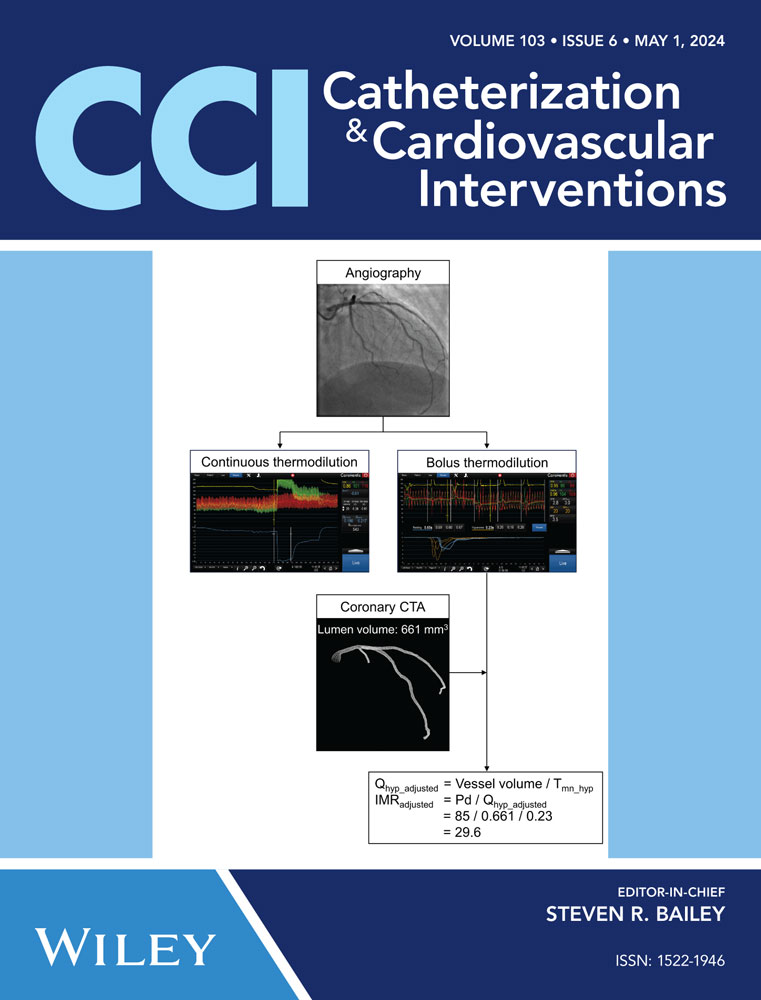Validation of the BCIS CHIP Score in chronic total occlusion percutaneous coronary intervention
Abstract
Background
The complex high-risk indicated percutaneous coronary intervention (CHIP) score is a tool developed using the British Cardiovascular Intervention Society (BCIS) database to define CHIP cases and predict in-hospital major adverse cardiac or cerebrovascular events (MACCE).
Aim
To assess the validity of the CHIP score in chronic total occlusion (CTO) percutaneous coronary intervention (PCI).
Methods
We evaluated the performance of the CHIP score on 8341 CTO PCIs from the Prospective Global Registry for the Study of Chronic Total Occlusion Intervention (PROGRESS-CTO) performed at 44 centers between 2012 and 2023.
Results
In our cohort, 7.8% (n = 647) of patients had a CHIP score of 0, 50.2% (n = 4192) had a CHIP score of 1–2, 26.2% (n = 2187) had a CHIP score of 3–4, 11.7% (n = 972) had a CHIP score of 5–6, 3.3% (n = 276) had a CHIP score of 7–8, and 0.8% (n = 67) had a CHIP score of 9+. The incidence of MACCE for a CHIP score of 0 was 0.6%, reaching as high as 8.7% for a CHIP score of 9+, confirming that a higher CHIP score is associated with a higher risk of MACCE. The estimated increase in the risk of MACCE per one score unit increase was 100% (95% confidence interval [CI]: 65%–141%). The AUC of the CHIP score model for predicting MACCE in our cohort was 0.63 (95% CI: 0.58–0.67). There was a positive correlation between the CHIP score and the PROGRESS-CTO MACE score (Spearman's correlation: 0.37; 95% CI: 0.35–0.39; p < 0.001).
Conclusions
The CHIP score has modest predictive capacity for MACCE in CTO PCI.
CONFLICT OF INTEREST STATEMENT
James W. Choi: Medtronic advisory board. Paul Poommipanit: consultant for Asahi Intecc, and Abbott Vascular. Jaikirshan J. Khatri: has received personal honoraria for proctoring and speaking from Abbott Vascular, Medtronic, Terumo, Shockwave, and Boston Scientific. Farouc A. Jaffer: has done sponsored research for Canon, Siemens, Shockwave, Teleflex, Mercator, and Boston Scientific; and has been a consultant for Boston Scientific, Siemens, Magenta Medical, IMDS, Asahi Intecc, Biotronik, Philips, and Intravascular Imaging Inc. He has equity interest in Intravascular Imaging Inc., DurVena; and the right to receive royalties through Massachusetts General Hospital licensing arrangements with Terumo, Canon, and Spectrawave. Rhian Davies: speaking honoraria from Abiomed, Asahi Intec, Boston Sci, Medtronic, Shockwave, and Teleflex. She also serves on advisory boards for Abiomed, Avinger, Boston Sci, Medtronic, and Rampart. Khaldoon Alaswad: has been a consultant and speaker for Boston Scientific, Abbott Cardiovascular, Teleflex, and CSI. Lorenzo Azzalini received consulting fees from Teleflex, Abiomed, GE Healthcare, Asahi Intecc, Philips, Abbott Vascular, Reflow Medical, and Cardiovascular Systems, Inc.; serves on the advisory board of GE Healthcare; and owns equity in Reflow Medical. Kathleen E. Kearney reports consulting fees or honoraria from Asahi Intecc, Abiomed, Boston Scientific, Philips, Medtronic, Teleflex, and Reflow medical. Nidal Abi-Rafeh: Proctor and speaker honoraria from Boston Scientific and Shockwave Medical. Ahmed ElGuindy: Consulting Honoraria: Medtronic, Boston Scientific, Asahi Intecc, Terumo; Proctorship fees: Medtronic, Boston Scientific, Asahi Intecc, Terumo. Emmanouil S. Brilakis: consulting/speaker honoraria from Abbott Vascular, American Heart Association (associate editor Circulation), Biotronik, Boston Scientific, Cardiovascular Innovations Foundation (Board of Directors), CSI, Elsevier, GE Healthcare, IMDS, Medtronic, and Teleflex; research support: Boston Scientific, GE Healthcare; owner, Hippocrates LLC; shareholder: MHI Ventures, Cleerly Health, Stallion Medical. The remaining authors declare no conflict of interest.
Open Research
DATA AVAILABILITY STATEMENT
Research data are not shared.




